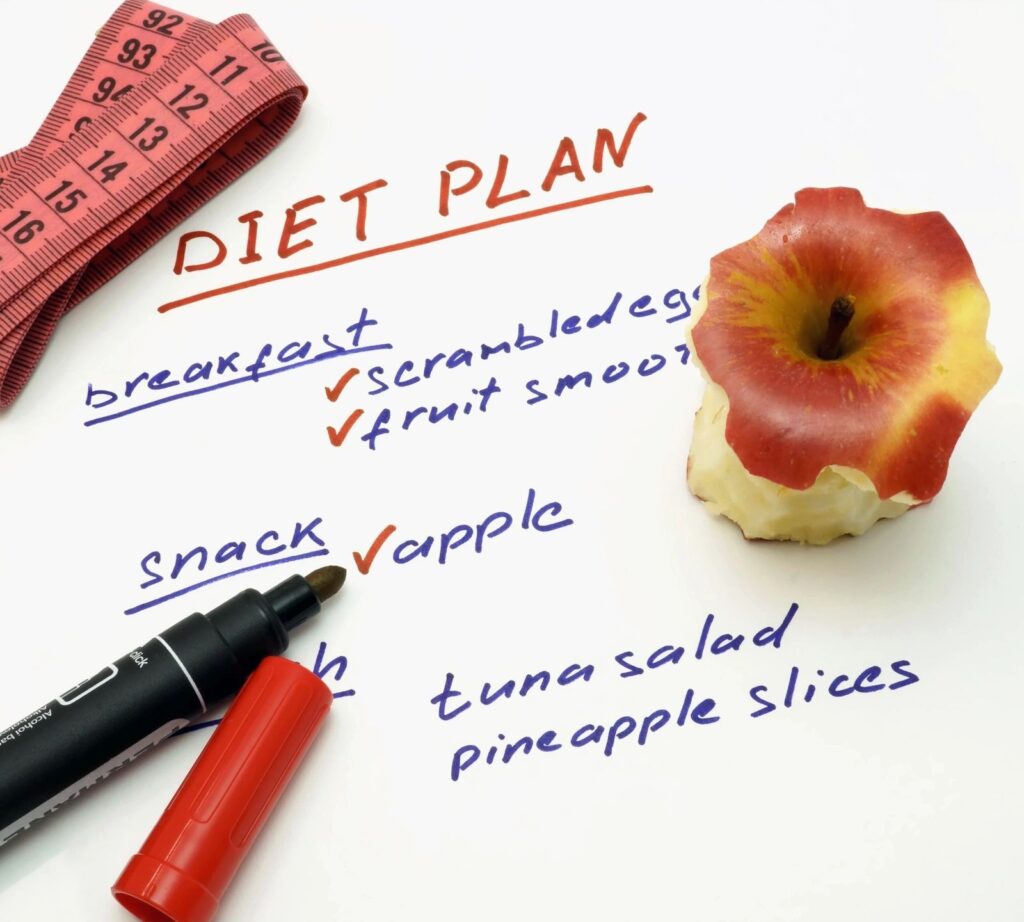
Fad Diets can be dangerous. This article explores these diets and considers more safe, sustainable alternatives to a healthy lifestyle.
Can you recall a time that you’ve been wooed by a shiny new diet that promises to change your body and your life for the better?
I can. I’ve tried about a dozen trendy diets in my lifetime in an effort to change my body. Dieting was a common topic of conversation among peers when I was younger, so I jumped on the bandwagon. For years I tried different versions of extreme diets, hoping one would result in some special form of weight loss.
Unfortunately, the outcome was always this: a lot of wasted time and effort! I never experienced lasting weight loss. And I usually felt worse about myself afterwards.
Dieting: Is This a Familiar Story?
My personal experience is shared by many adolescents and adults, especially in the United States. American culture tends to focus on physical appearance, idealizing thinness rather than a person’s overall health. In fact, weight loss is a $66 billion industry in America, with fad diets making up a lot of this cost. And, like my own example demonstrates, these diets are almost always counterproductive.
So, why do we continue to seek out and celebrate fad diets?
What Defines a “Fad” Diet?
Here are some of the most common hallmarks of a fad diet:
- hugely popular for a period of time
- promoted by celebrities or media personalities
- made to seem trendy and exciting
- a purchase of some sort (book, supplement, etc) accompanies the diet and is encouraged to be purchased
- includes a claim that promises a quick fix or seems too good to be true, like losing a lot of weight in a short amount of time
- details a list of foods to avoid or a strict set of food rules
- based on very little science, or sometimes just a theory
Many of the above traits can make these fad diets seem incredibly appealing, and this is why they continue to persist. However, the negative aspects of these diets are important to consider.
Downsides of Dieting
Based on my personal and professional experiences with fad diets, I strongly discourage anyone from beginning a fad diet. Below are some evidence-based reasons that support my opinion.
Negative Effects of Dieting:
- Long-term Weight Cycling. Many fad diets are chosen to initiate rapid weight loss. While an initial loss may occur, only about a quarter of people who start a fad diet can successfully keep the weight off for a year. And then, almost all weight is regained within three years, and sometimes additional weight is gained. This can lead to another cycle of dieting and gaining, and it continues.
- Metabolic Disturbances. Biologically speaking, the human body was not built for drastic weight loss. When weight is lost quickly, our bodies panic and suspect something is very wrong. In response, our hunger hormone, ghrelin, increases and our fullness hormone, leptin, decreases. What does this translate to? Your body urging you to eat more, no matter how hard you try to fight against it.
- Risk of Nutrient Deficiencies. If calories are significantly reduced, or a food group is eliminated, there is a risk of missing out on certain vitamins or minerals. This would depend on the types of foods eliminated and the length of the diet. Generally, the more extreme the diet is, the higher the risk of deficiencies.
- Muscle Loss. Diets that promote severe calorie restriction can lead to weight loss, but up to a quarter of weight loss may be from muscle instead of fat. Not only will losing muscle affect strength and stamina, it can affect the body’s ability to burn calories long-term. If weight cycling occurs over many years, resulting muscle loss may make it gradually more difficult to keep weight off, despite eating less.
- Reduced Quality of Life. Because fad diets often set extreme rules and restrictions, a person may feel the need to avoid people or events to honor the diet. Over time, after the novelty and excitement of beginning the diet wears off, mental and emotional fatigue set in and a desire for normal eating habits returns.
An Alternative to Diet Culture
It IS possible to achieve good health without going to extremes. Unfortunately, most safe and practical eating patterns show better long-term results. They’re often ignored in favor of quick fixes.
Adopting an eating pattern that emphasizes good nutrition is crucial for sustainable health. Small, consistent changes like simply adding more vegetables to your meal can give you a better long-term return on investment.
Behavioral changes can also make a significant difference when it comes to maintaining a healthy weight. In fact, this is often key for most people. Paying attention to your habits surrounding food can be a really good starting point. Do you notice that you’re snacking mindlessly after dinner? Have you fed yourself appropriate during the day? Are you adding in enough self-care during the day? The trick is not in knowing what we need to do, but in actually learning how to integrate the information into our lives in a consistent way.
Lastly, understand that there is no perfect way of eating. If you think your diet has to be perfect, you may become overwhelmed and set yourself up for failure. The best eating pattern for you is unique and can shift in many ways over time. Try to be at peace with the fact that a one size fits all approach is not necessarily helpful for your own personal goals.
Need Support?
I strongly believe balance is possible! If you’re interested in changing your habits and want personalized support, connect with me so we can get started. I offer individual counseling and coaching sessions, as well as a group Intuitive Eating program that you get you on a path to freedom from dieting.
Click on this link to set up a free 15-minute inquiry call today: https://p.bttr.to/3HUNnQ6

References:
- Johnson J. Fad diets are bad diets. American Council on Science and Health website. https://www.acsh.org/news/2018/07/02/fad-diets-are-bad-diets-13134. Updated July 2, 2018.
- The Weight Loss and Diet Control Market, February 2019.
- Engel M et. al. Micronutrient Gaps in Three Commercial Weight-Loss Diet Plans. Nutrients. 2018 Jan 20;10(1):108. doi: 10.3390/nu10010108.
- Noto H, Goto A, Tsujimoto T, Noda M. Correction: low-carbohydrate diets and all-cause mortality: a systematic review and meta-analysis of observational studies. PLoS One. 2019; 14(2):e0212203.
- Maclean P, et. al. Biology’s response to dieting: the impetus for weight regain. American Journal of Physiology Regulatory Integrative and Comparative Physiology. 2011 Sep;301(3):R581-600.



